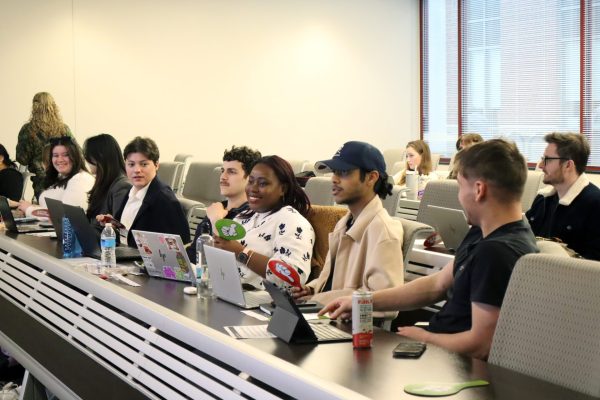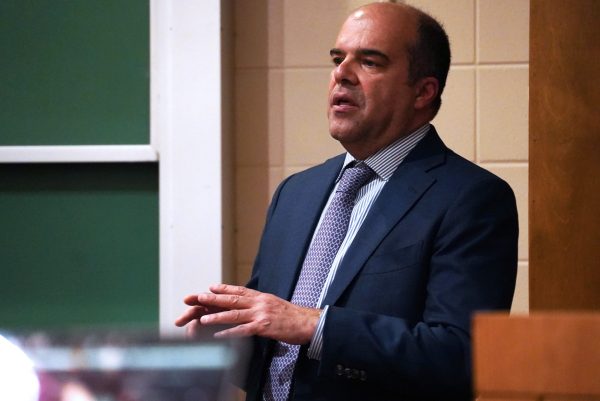DePaul students share concerns about switch to online learning
As DePaul University plans to transition Spring Quarter classes to online, some students share concerns about their abilities to focus in virtual classroom settings. While many factors play into which environment is better for learning and for whom, the rapid switch to online is giving students an uneasy feeling and many unanswered questions.
DePaul only offers five online bachelor’s degrees and 20 master’s degrees. Many of those involve data, computers and technology, according to the DePaul website. As a whole, there are 95 distinct undergraduate degrees in 63 different majors. Many of those are not meant to be done online, leaving many students concerned.
“This is my last quarter at DePaul, where I have been double-majoring in honors accounting and management information systems,” DePaul senior Ellie Mager said. “I have actively avoided taking online classes in the past year because I know myself and I know that I don’t learn well that way. My worst grades have been in online classes, and I’m worried about maintaining my GPA and dean’s list qualifications.”
Online classes and in-person classes offer a fair share of pros and cons. With transitioning an entire school online with different majors, there needs to be many ways to help students succeed given all students learn, engage and take in material differently.
“There’s certainly a lot of benefit from in-person classes,” said Amber Settle, a computer science education professor specializing in online learning. “But online classes — if they’re done well — have a lot of benefits, too; you can have a lot more information available online.”
DePaul provides faculty with an opportunity to gain online teaching experience through the DePaul Online Teaching Series (DOTS).
“There are technologies that DePaul has available that are going to make this easier for faculty,” Settle said. “I think the issue, though, is that there’s probably some faculty in some departments who probably haven’t used this stuff.”
It is not a requirement for faculty to obtain, but it helps them to design, build and facilitate successful online courses over a three-week-long training. With the transition to online, faculty may have to do training, such as DOTS, in order to prepare for Spring Quarter.
“I chose to complete the DOTS training because online teaching can be very different from teaching in-person, and I wanted to get guidance on how to help students succeed in an online class,” said Amy Merrick, a professional lecturer at DePaul.
To mirror classroom-like settings, some professors — including Settle — have turned to Zoom meetings for their online editions of class in the past. Zoom is a “software-based conference room solution,” per its website.
“You can have kind of an arbitrary number of people in this online forum where people can post questions and they can, you know, talk to each other, and I can share my screen with them,” Settle said. “It’s kind of like everybody looking over my shoulder when I’m talking about programming.
Settle said successful transitions to online learning may vary by department.
Environmental science major Bailey Didier’s spring schedule originally consisted of Atmospheric Chemistry, General Biology III and Urban Forests as Social-Ecological Systems labs.
At this point, however, Didier is unsure of how her schedule will now look.
“Some of my labs actually count for a separate credit hour, so if they get cancelled I don’t know if I’ll technically be able to pass the class,” Didier said. “I know that they’re working on it and that the professors will accommodate us, but it’s just weird not knowing what’s going to happen or how Spring Quarter is going to look.”
The lack of clarity from the university surrounding the plan for the entirety of spring quarter is a common concern among students. In an email from DePaul President A. Gabriel Esteban, it states that campus will remain open, but in-class meetings will not continue.
“The way they are handling it and the lack of information is pretty frustrating,” DePaul freshman Harry Settel said.
Some students believe this is a correct course of action on DePaul’s part and that it is necessary for the student body and those surrounding.
DePaul senior Derek Feiereisel thinks there isn’t a clear understanding of what is going on and that people need to adapt.
“Will it be permanent? No,” he said. “But everyone will need to make sacrifices and changes for the greater good. The next few months, maybe even the next year will be different, but the sooner people accept that, the easier it will be for everyone.”
On the other hand, many students have expressed increased feelings of anxiety due to this sudden move to online, with some saying the switch is unfair of the university without asking student opinion — and stating fears of failure in the newfound digital classrooms.
“While it is a medical necessity, that doesn’t mean it isn’t also a huge inconvenience for students, especially those who cannot function with online courses,” DePaul senior Paden Guido said. “It can be necessary but still cause an overwhelming amount of stress for those of us who aren’t neurotypical in their learning abilities and literally cannot function within an online setting.”
Online learning environments should have a combination of modalities for students to engage with their professors.
“Students are interactively trying to do exercises,” Settle said. “So that’s why I’m planning to do Zoom meetings where I’m actually going to be live. And we’re actually in kind of a live interaction. You know, discussion forums are good for students to kind of interact with each other, especially asynchronously, you know, everyone’s not there all at the same time.”
The functionality of some online alternatives — like Zoom — may benefit students with some learning disabilities.
“If I’m looking at someone who has attention deficit disorder, and may have difficulty focusing, Zoom lets you record things,” Settle said. “And so they can go back then. And they can watch, you know, in shorter segments kind of over a longer period of time, which could end up being comfortable for them.”
Settle said students need to stay motivated and try not to procrastinate their work, even though it can be easier to fall behind in online settings.
“It’s also important to make sure that you’re still in communication with your faculty member about things that you’re confused about, because I know students will come to my office hours and get some clarification on things,” Settle said. “And I think students need to make sure that they’re taking advantage of any opportunities that faculty are providing for interaction even though that’s going to be online.”
















